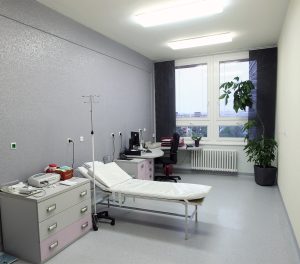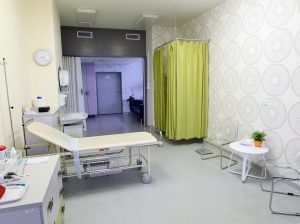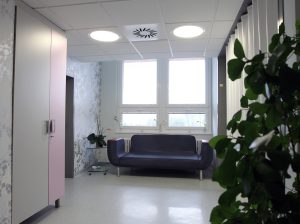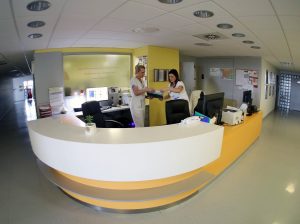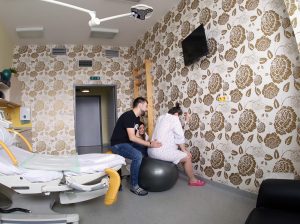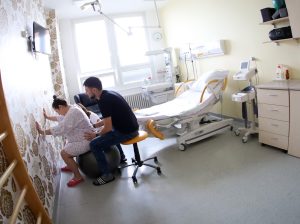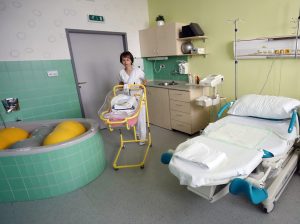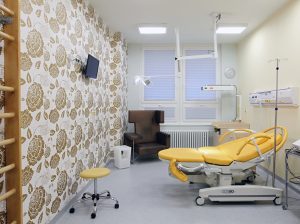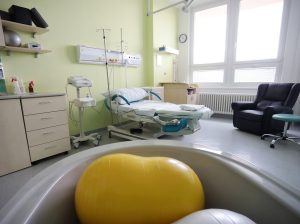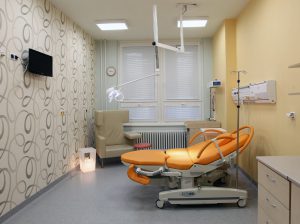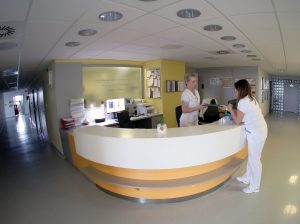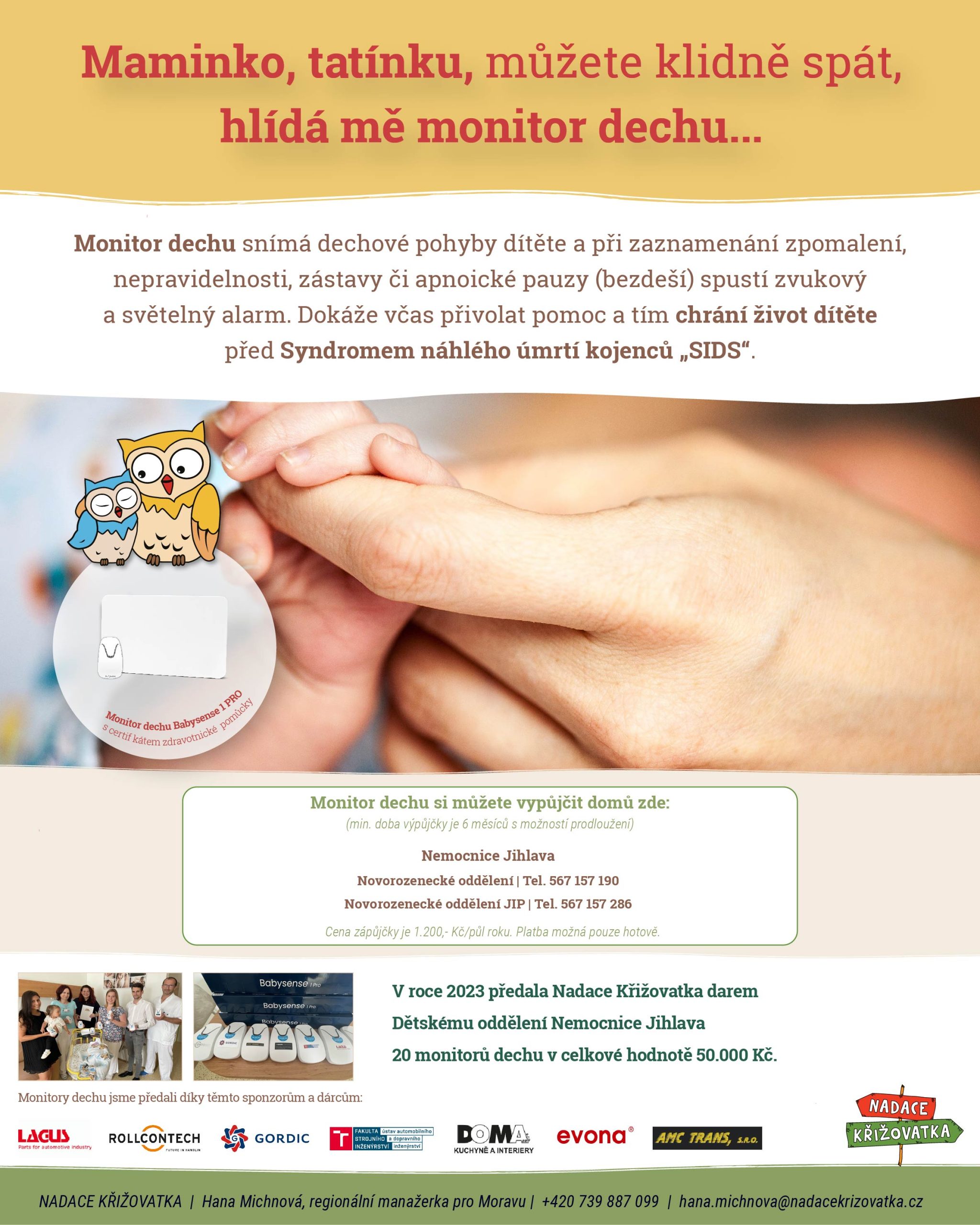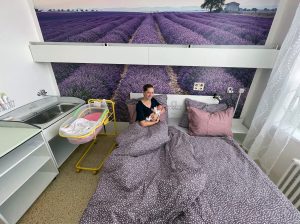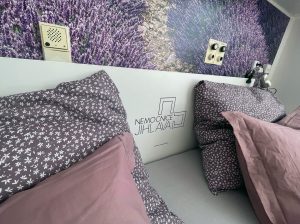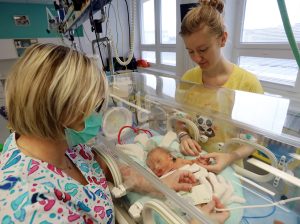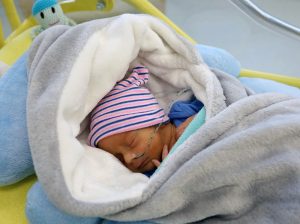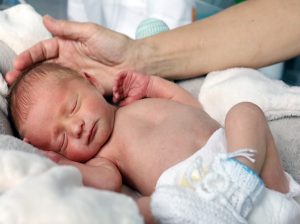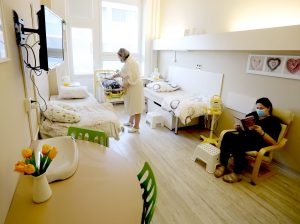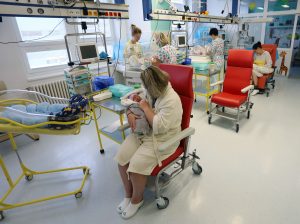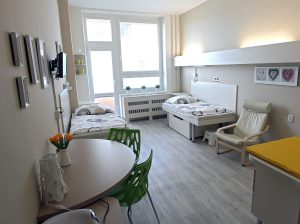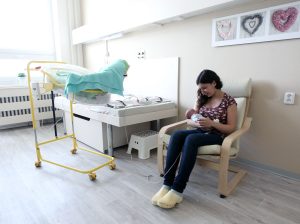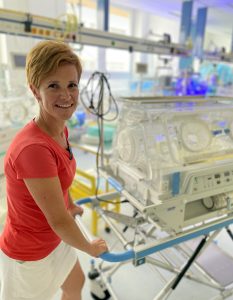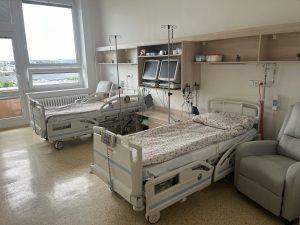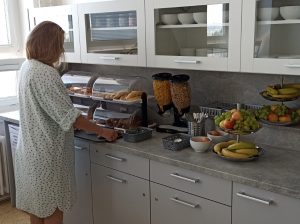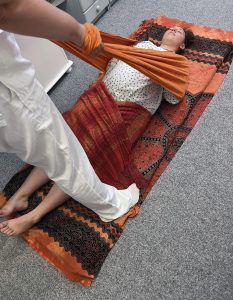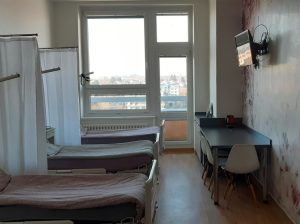- Delivery-room clinic
The delivery-room clinic is located on the 5th floor of Block G and is a part of the delivery room. It provides preventive, therapeutic and conciliatory activities for pregnant women from the 24th week of pregnancy on. Two separate clinics are available.
Pregnant women are looked after by midwives and doctors of the gynaecology and obstetrics department. The clinic is equipped with complete instrumentation for checking the condition of a pregnant woman and the fetus (cardiotocographs, ultrasound and others).
Clients who decide to give brith in the Maternity Hospital Jihlava should be reffered there by their district gynaecologist at approximately 36th week of pregnancy to check-in for the delivery, which also takes place in the delivery-room clinic. An individual delivery management strategy is determined there for each client and all risks are assessed. The check-in also includes an ultrasound biometry (fetal weight measurement by ultrasound). If you have your own delivery plan or in case of any wishes or questions about the delivery, it is advisable to discuss them at the check-in, which offers a space to do so.
In case of the uncomplicated pregnancy, mothers-to-be are referred to the care of the delivery-room clinic by the district gynaecologist at the time of the delivery. Counselling sessions are then held there after the due date. This usually includes a cardiotocographic recording (recording of fetal and uterine activity), a check of the mother-to-be general condition, or a vaginal examination.
The Delivery room clinic also handles all admissions of pregnant patients from the 24th week of pregnancy onwards - admissions for delivery, elective admissions for caesarean sections and acute admissions for pregnancy pathologies. If you are coming to the reception for any reason, ring the bell at the entrance door of the clinic. During duty hours i.e. between 3pm and 7pm, you should ring the bell at the red door just outside the lift on the 5th floor.
For pregnant clients with acute problems, the delivery-room clinic is open non-stop.
We offer you a consultation of a birth plan with a midwife. Office hours are on Tuesdays 12h to 14h, the consultation takes about 30min. This service is intended for pregnant women from the beginning of the second trimester on. It is possible to discuss your ideas about the delivery or a birth plan. Depending on the current situation a tour of the delivery rooms can be made. The presence of a partner or other accompanying person is welcome. The doctor of the delivery room may also be present. The consultation must be booked in advance via the e-ambulance system, the link is below. Bring your pregnancy card and prepare questions you are interested in beforehand. You do not need a referral or any recommendation from your gynaecologist. Our midwives look forward to seeing you.
Contact: +420 567 157 680
On workdays call between 7:00-15:30You can make an appointment for a birth plan consultation with a midwife HERE
- Delivery room
Delivery rooms
The mother-to-be can choose who will accompany her to the delivery. It is usually a husband/partner, or a mother, a sister or a friend. We also welcome the presence of a doula. The attendant may stay with the mother-to be for the duration of the delivery, and for 2 hours after, when the woman stays in the delivery room.
In the first stage of labour, women are advised to exercise, have a warm shower, use relaxation aids, aromatherapy, massage, or vaginal douching as they wish.
The staff is used to working with delivery plans. It is preferable to discuss it in advance during the check-in or during the midwife's consultation hours (bookable via e-ambulance).
The application of the douching and shaving can be done as wished.
In our maternity ward we support the idea of the natural childbirth. We do not routinely introduce flexilla (venous input), we do not routinely perform perineal incision. We recommend preparation of the perineum for delivery - aniball or perineal massage.
At the client's request, we can administer pain-relieving drugs, including epidural analgesia. We can also offer using Entonox inhalation analgesia for the delivery or treating delivery-made injuries.
Physiological birth is managed by midwives in the presence of a doctor. In an uncomplicated birth, the woman may choose a position such as the side position, semi-sitting, sitting, standing, squatting or "on all fours". A birthing stool or birthing bag can be used. We also offer optional delivery in water.
After an uncomplicated birth, the mother receives the newborn baby immediately on her chest, we let the umbilical cord attached. Breast attachement is possible to do right away. We encourage the post-delivery bonding in the delivery room for 2 hours. Information on the safe bonding can be found in the downloadable documents.
The midwife follows all 10 steps to successful breastfeeding. It is possible to use the services of a lactation consultant.
In the case of an uncomplicated postpartum, the mother and child usually leave the Hospital Jihlava on the 3rd day after the delivery.Surgery room
The surgery room for the caesarean-section performing is located in the vicinity of the delivery rooms.
There is a difference between a planned caesarean section, which is mostly performed due to the serious medical indication of the mother or the child, and an acute caesarean section, which is usually performed when the health or life of the child or the mother during the delivery is in danger for some reason. In case of a sudden obstetric pathology that requires an acute termination of the delivery, a caesarean section can be performed within 15 min.
More than 90% of caesarean sections are performed in our delivery room under spinal anaesthesia. Its advantage is that the mother-to-be is fully conscious throughout the duration of the surgery (the lower half of the body is numb). The mother can literally see her baby coming into the world and can communicate with the doctors and her partner, who can usually participate by agreement with the surgeon.
During the caesarean section, if the newborn baby is in a good condition, it is possible to perform the attachment in the surgery room if the surgeon allows to do so. Bonding may also take place on the skin of the baby's mum or dad.
In our ward there is a full rooming-in, so the newborn baby is with its mother continuously even after a caesarean section. The baby nurses help with the care at first.
In case of an uncomplicated course of the caesarean section, the mother and child leave the Hospital Jihlava on the 3rd day after the delivery without the need to remove the absorbable skin suture. - Neonatal department
Novorozenecké oddělení Nemocnice Jihlava poskytuje komplexní péči o zdravé novorozence narozené v jihlavské porodnici. Naším cílem je podpora kojení a co největší počet plně kojených dětí při propuštění. Je zde zaveden systém rooming-in na všech pokojích. Maminky jsou v nepřetržitém kontaktu se svými dětmi od porodu až do propuštění, a to i v případě, že jsou po císařském řezu.
In case of a physiological delivery, your baby will be immediately placed on your abdomen, marked with a bracelet and the umbilical cord will be cut. Depending on the baby's condition and mutual agreement, the baby will be taken care of on the changing table in mother's presence. The umbilical stump is treated, the baby is weighed, length, body temperature is taken and the head and chest circumferences are measured. Bonding on the mother's body and attachment to the breast is performed then. During bonding, we monitor all vital signs of a baby using a saturation probe attached to the baby's leg. Within 24 hours after the delivery, the baby will be examined by a pediatrician.
The postnatal bathing takes place at the same time as the bathing demonstration in 6 - 24 hours directly in the room of the six-week ward. Only in indicated cases, the 1st bath takes place in the delivery room.
Most of the nurses in the neonatal unit also work as lactation consultants who can help and advise you on breastfeeding and baby care. The ward has a Lactation Clinic which is also available to mothers after their discharge from the hospital.
During your baby's stay in the neonatal unit, we carry out screening examinations to perform the early detection of serious diseases in babies.This screening is regulated by the Czech legislation and are covered by the general health insurance.
Newborn laboratory screening for congenital and hereditary diseases
The newbon's blood drop is taken within 48 to 72 hours after the delivery.
Objective: the early detection of serious diseases that cannot be detected any other way. Early detection allows treatment to be initiated immediately and so it prevents a child's permanent disability.
The best-known monitored diseases include congenital hypothyroidism (reduced thyroid function), phenylketonuria (a serious metabolic defect that threatens the neurodevelopment), congenital adrenal hyperplasia (congenital lack of adrenal function) and cystic fibrosis, SMA and SCID.
For more information see: www.novorozeneckyscreening.czUltrasound of the kidneys
Objective: to determine whether the kidneys of the baby are properly formed - their length, shape, location, cupping system are checked and also if their emptying is normal.
It is performed by a paediatrician in the room in the mother's presence on the 2nd day after the delivery.Orthopaedic hip check-up
Objective: early detection of a hip development disorder, which can occur in 3-5% of the population. Early treatment and monitoring can prevent severe hip damage with permanent consequences.
The check-up is carried out by an orthopaedist in the room in the presence of the mother and includes a clinical check-up of the hip joints and a preventive examination of the hip joints by ultrasound. The check-up includes a comprehensive clinical examination of the large-joint mobility.Screening for congenital lens cataract
Objective: early detection of cataracts leads to early treatment.
It is performed by the pediatrician in the room in the presence of the mother during the morning rounds, the ophthalmoscope is used to make the red reflex in both eyes.Screening of hearing
Objective: early detection of congenital hearing loss in children and provision of the preventive follow-up care, mainly the delayed development of the communication skills in children can be prevented.
A basic hearing test can be performed on the 2nd day after the delivery. It is a simple, painless examination. The baby receives a soft measuring probe in the ear canal, the machine sends a weak sound stimulus and records the responses of the auditory system. The child is asleep or awake during the examination.The discharge of the baby to the home care is planned after all medical, legal and social conditions are met, i.e. all screening tests are performed, the baby is healthy without jaundice, the mother is managing the care and nutrition of the baby and the baby is thriving. According to the recommendations of the Czech Society of Neonatology, the discharge is possible after 72 hours. It is important to arrange in time for a district paediatrician to take over the care of the child.
It is possible to rent a monitor of baby's breating (Baby Sense). In cooperation with the Křižovatka Foundation the fee is 1200 CZK for 6 months.
Our goal is a happy mother and a happy baby.
- Neonatal ICUPéče o nedonošené či nemocné novorozence má v Jihlavě dlouholetou tradici. Jednotka diferencované péče o novorozence byla v rámci našeho oddělení založena již v roce 1988.
Od roku 2007 jsem hrdými nositeli statusu Perinatologické centrum intermediární péče (PCIMP). Ten nás opravňuje k péči o novorozence narozené od ukončeného 31.týdne těhotenství u jednočetných gravidit a od 32.týdne u vícečetných.Na novorozeneckou JIP se přijímají děti přímo z porodního sálu, překládány děti z oddělení fyziologických novorozenců, jejichž zdravotní stav vyžaduje intenzivní léčbu či monitoraci a dále-většinou na žádost rodičů-novorozenci narození v Perinatologických centrech intenzivní péče (nejčastěji v Praze či Brně), jejichž zdravotní stav a zralost transport umožňuje.Rodiče mohou své děťátko kdykoli navštěvovat a jakmile je to možné, jsou zapojeni do každodenní péče. Naším cílem je krmení dětí mateřským mlékem, pokud děťátko z jakéhokoliv důvodu nemůže být kojeno, podáváme odstříkané mateřské mléko alternativními způsoby. Tyto dovednosti se maminky /rodiče učí pod dohledem školeného personálu.Pro maminky hospitalizovaných dětí jsou k dispozici dva dvoulůžkové pokoje s koupelnou a WC a plně vybavená kuchyňka.
Navazující péči o perinatálně ohrožené děti po propuštění z nemocnice zajišťuje specializovaná ambulance. - Puerperium and pregnancy-in-risk department
The department provides postpartum care for women and newborns, as well as hospital care for women with risky or pathological pregnancies.
The clients are offered standard rooms with two or three beds, two of which have shared bathroom facilities. The "full rooming-in" system, i.e. joint postnatal care of mother and newborn immediately after birth, is a standard feature. Maximum attention is paid to the development of lactation in the mother and breastfeeding of the newborn. Every breastfeeding mother has the opportunity to use the services of a lactation consultant.
We provide women with vaginal douching, rebozo care, aromatherapy, massage, hydrotherapy and taping during preinduction.
ROOM FOR PREGNANT WOMEN
The newly renovated room serves as a facility for women before childbirth and women with risky pregnancies.
UPSTANDARD ROOMS
We also have 5 ustandard rooms available for our clients where the presence of a partner is possible during the entire stay. One room is equipped with a double bed so that the family can be together from the first moments.
RECOVERY ROOM
The ward also has a recovery room for two clients with the option of monitoring vital signs. This allows you to go to the puerperium ward right after a caesarean section and have the baby with you at all times and to start early bonding after the caesarean section.
BUFFET
Breakfast is in the form of a buffet. We would like to provide you with the most varied selection of food, which is ideal for breastfeeding mothers.
WRAPAROUND SCARVES
We lend scarves to support uterine winding after delivery during hospitalization. The scarf provides support to the pelvic floor, congested sacroiliac joint area, relieves involutional pain, helps correct posture.
TAPING
Our midwives offer assistance with back pain, abdominal muscle spacing (diastasis), initiation of lactation and healing of the Cesarean scar.
PHOTO WALL
To capture memories of the first days in the maternity hospital, a new photo wall has been created at which you can take a photo during your stay or when you go home.
Maternity Ward






